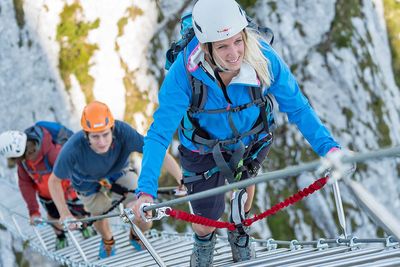Are you ready for an adventure? On the via ferrata Intersport Donnerkogel in the Dachstein West hiking region enthusiastic mountain adventurers can experience climbing fun at the highest level.
You climb up the airy ridge on the Donnerkogel in four stages on the Via Ferrata using steel ropes and pegs. The ultimate adrenaline kick awaits you on the 40-metre-long sky ladder, the highlight of every climbing tour.
But be careful: It is important to plan in advance, to keep an eye on the weather situation and to pay attention to our safety instructions! We also recommend you to plan enough time in reserve, to postpone your climbing tour to another day in case of bad weather and to check your equipment in advance. All important points are summarised below!


Key facts via ferrata Donnerkogel
Difficulty = moderate/difficult
Climbing high = 470 elevation gain
Total high = 650 elevation gain
Difficulty = C
Climbing time = 3 hours
Total time = 5 - 5.5 hours
Ideal for = advanced, NOT for beginner's
Peak = Großer Donnerkogel (2054 m)
Via ferrata Donnerkogel
Access to the via ferrata:
Access Gosau = min. 30 minutes from mountain station Gosaukammbahn
Access Annaberg = 1 hour from mountain station Donnerkogelbahn


40-metre-long sky ladder
Pure adrenaline and thrills on the sky ladder at the Intersport via ferrata Donnerkogel.
The new 40-metre panoramic sky ladder is the new TOP attraction on the Zwieselalm for climbing enthusiasts. Free-floating, the 40-metre-long sky ladder takes you over a deep gorge up to the "Donnermandel". Pure thrills!
In addition to an adrenaline kick, the climbing tour offers a fantastic view of the Dachstein Glacier, the surrounding mountains and the entire Gosau Valley.
The new sky ladder was built by Outdoor Leadership under the leadership of Heli Putz and his team.
Route description via ferrata Donnerkogel
1st stage: From the entrance, climb briefly to a corner (B/C). A beautiful traverse of slabs (A/B) leads to a straddle (B/C). This is followed by the steep and challenging "Kaiser-Verschneidung" (C/D), one of the two key sections. Then left onto an earthy strip (A and A/B) and to another, somewhat more difficult slab traverse (C). Around a corner it goes to the "Enzianwand" (B/C). The trail leads up through the mountain pines in a zigzag course and then to a saddle on the left. The "Ziehkögelgrat" (max. A/B) is reached via two ladders (B, briefly C in between). At the end of the 1st stage there is an emergency exit (down to the right).
2nd stage: In the section "Long live the hunt" you first cross to the left (A/B). This is followed by some ladders laid on the ground (A). Another traverse (A) is followed by some upturns (B). After the "Gamsband" (A) you have to climb down a bit in the earthy-slippery terrain (A/B). Then the long traverse climbs again (A/B, short section B/C) and meets the 40-metre giant ladder. At the ladder, you can exit to easy terrain and bypass the "Donnermandl" or climb down to the descent path (emergency descent). The highlight is of course the 40-metre giant ladder, on which you can climb directly over to the "Donnermandl" easily (B) but very exposed and therefore considered by many to be more difficult.
Stage 3 without the giant ladder: After a short walking area (emergency descent to the right), there is a short traverse (A/B and C) and the steep and very exposed ascent - where the 40-metre giant ladder also docks with the "Donnermandl" - (first C/D, then easier) to the "Donnermandl" (1,920 m). This is the second key section of the climb (this must also be mastered by giant ladder climbers). Afterwards, briefly climb down into a saddle (B). The 3rd stage can also be bypassed.
Stage 4: Quite steep up the former "Preuß route" via the northwest ridge (C). Soon the ridge becomes flatter and wider (B). The exit is reached after overcoming individual steep steps (A/B and A).

Kletterkurse
With the experienced mountain guides and climbing professionals from Outdoor Leadership you will find the right introduction to the world of climbing or you will improve your skills for the ascent of difficult via ferrata routes.
Outdoor Leadership
Tel. +43 6135 6058
Tour planning:
A requirement for every climbing tour is an accurate tour planning with a via ferrata guide and map.
Pay attention to the levels of difficulty of the via ferrata and do not overestimate your ability!
Find out about the weather situation and the current conditions for the ascent and descent.
Draw up a timetable for the ascent, via ferrata, descent and always plan a time reserve for possible emergencies.
Note in bad weather:
Via ferrata routes are dangerous in bad weather, as the wire rope anchorages can become lightning rods.
Information on the current Dachstein weather can be found at Dachstein weather forecast.
In spring, you have to reckon with leftover snow on the via ferrata.
Make sure you use the right equipment:
Check your equipment for safety defects before every climbing tour!
The complete climbing equipment consists of: Helmet, chest harness, seat harness and carabiners, via ferrata gloves, climbing shoes and suitable climbing clothing.
Take emergency equipment with you: First aid kit, bivouac sack, mobile phone!
Via ferrata ascent:
You should only climb via ferratas if you are familiar with your equipment and know how to use it.
Partner check before you start! Check each other's equipment to make sure it is complete and correctly fitted.
During the climb, always keep an eye on the weather, your physical condition and the time schedule.
Watch out for other climbers and plan time for overtaking.
You can also find important tips for tour planning and behaviour on the via ferrata in the "Alpenvereinaktiv-App".
Don't subordinate everything to the entry in the summit book or the completion of a tour - have the courage to break off or turn back!